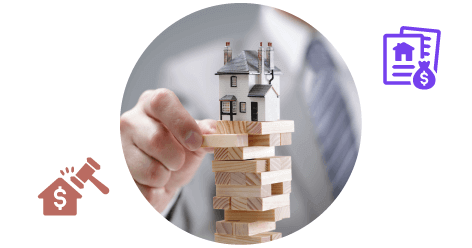Foreclosure Roulette - A game of extend and pretend

I spoke last week at a real estate investment club and shared with the audience my belief that foreclosures will trickle out over a very long time rather than the prediction of a "wave" of foreclosures as many continue to inaccurately posit.
|
|
I do however, understand the nature of those predictions. Given the number of household that aren't paying their mortgage (delinquencies), on paper, we should be seeing a massive wave of foreclosure notices, and ultimately foreclosure sales. It's a logical conclusion. But this has become a political problem in a world of financial fantasy, so I don't believe that simple logic applies.
The reality is that through financial engineering (interest only, subprime, swaps, option ARMs, negative equity, stated income, etc.,) we created trillions in excess mortgage debt that has left millions of homeowners underwater, financial institutions on the brink of collapse, and the FDIC nearly insolvent. Back in September 2008 it became clear that financial collapse was imminent, and the federal government did what it does best - bailed out those that caused the crisis leaving taxpayers holding the bag for the losses. Pulling this hat trick off required one simple ruse - getting everyone to believe that those losses ultimately wouldn't be very big.
To do this the government changed the rules. The FDIC who previously forced banks to get bad assets off their books became a leading proponent of saving homeowners with loan modifications that likely just delay the inevitable. With a little government pressure, the supposedly independent Federal Accounting Standards Board was pressured into letting banks account for loans at theoretical values based on computer models rather than current market value.
Next they began rolling out an acronym soup of programs, which they promoted as being help for America's homeowners - HAMP, HAFA, HARP, 2MP and more. But the reality is that to date these programs have resulted in little more than delays. The government and lenders say that these failures are due to complexities of implementation, difficulty reaching homeowners and a sundry other things. But what if these programs were never intended to succeed? What if they were simply intended to create delays, provide false hope, and maybe get the banks a bit more cash from trial loan mod payments?
Sounds like a crazy conspiracy theory, I know, but hear me out.
The problem faced by both lenders and the government is that they can neither afford to kick homeowners out, or bail them out. For lenders, either scenario forces losses to be recognized, while thanks to mark-to-model accounting rules, and little or no pressure to foreclose from the FDIC, they can instead leave non-paying homeowner in place and push those losses into the future. Many believe that most major corporations manage earnings, what could be more perfect than getting to choose when, and if, they recognize mortgage related losses. For the U.S. government either scenario is political death. Politicians have no appetite for allowing banks to put families on the street en masse through foreclosure, nor forcing banks to deal with the problem through bankruptcy cram-downs or other means. At the same time they realize their constituents who do pay their mortgage (or rent) simply won't stand for a taxpayer funded bailout of their upside down neighbor. Instead they believe bailouts should be saved for the truly deserving like the executives and corporate shareholders of banks, AIG, GM, etc.
If we aren't willing to either evict non-paying homeowners out of their homes, or bail them out, what other option is there? The answer is clear. It's the same thing we've done with national deficits for years. Trade tomorrow for today, with a policy of extend and pretend. I have no doubt this is the present policy, and that this will be the policy for years to come as we work through wiping out the trillions in excess negative equity that was created during the bubble.
A member of the audience during my recent speech asked if this policy was really possible, after all we can't just let non-paying homeowners stay in their homes forever. If paying homeowners figured that out, everyone would stop paying, and then our financial system would crumble. I agree, and it's clear the banks realize this too. But it is a problem that is easily solved by the diabolical game of Russian roulette. So long as lenders continue to foreclose on at least a handful of homeowners each month, in what from all appearances is a completely random game of chance, they'll keep those willing and able to pay their mortgage doing so. Those who decide not to pay their mortgage will find themselves playing today's update on the Russian game, Foreclosure Roulette, wondering each month whether they'll get another free month in their prison of debt, or finally be shot and forced to move.
I spoke last week at a real estate investment club and shared with the audience my belief that foreclosures will trickle out over a very long time rather than come as a wave of foreclosures as others continue to inaccurately predict.
I do, however, understand the nature of those predictions. Given the number of households that aren't paying their mortgage (delinquencies) we should be seeing a massive wave of foreclosure notices, and ultimately foreclosure sales. It's a logical conclusion. But this has become a political problem in a world of financial fantasy, so I don't believe that simple logic applies.
The reality is that through financial engineering (interest only, subprime, swaps, option ARMs, negative equity, stated income, etc.,) we created trillions in excess mortgage debt that has left millions of homeowners underwater, financial institutions on the brink of collapse, and the FDIC nearly insolvent. Back in September 2008 it became clear that financial collapse was imminent, and the federal government did what it does best - bailed out those who caused the crisis while leaving taxpayers holding the bag for the losses. Pulling this hat trick off required one simple ruse - getting everyone to believe that those losses ultimately wouldn't be very big.
To do this the government changed the rules. The FDIC who previously forced banks to get bad assets off their books became a leading proponent of saving homeowners with loan modifications that likely just delay the inevitable. With a little government pressure, the supposedly independent Federal Accounting Standards Board was pressured into letting banks account for loans at theoretical values based on computer models rather than current market value.
Next they began rolling out an acronym soup of programs, which they promoted as being help for America's homeowners - HAMP, HAFA, HARP, 2MP and more. But the reality is that to date these programs have resulted in little more than delays. The government and lenders say that these failures are due to complexities of implementation, difficulty reaching homeowners and a sundry other things. But what if these programs were never intended to succeed? What if they were simply intended to create delays, provide false hope, and maybe get the banks a bit more cash out of homeowners in the form of trial loan modification payments?Sounds like a crazy conspiracy theory, I know, but hear me out.
The problem faced by both lenders and the government is that they can neither afford to kick homeowners out, or bail them out. For lenders, either scenario forces losses to be recognized, while thanks to mark-to-model accounting rules, and little or no pressure to foreclose from the FDIC, they can instead leave non-paying homeowner in place and push those losses into the future. Many believe that most major corporations manage earnings, what could be more perfect than getting to choose when, and if, they recognize mortgage related losses. For the U.S. government either scenario is political death. Politicians have no appetite for allowing banks to put families on the street en masse through foreclosure, nor forcing banks to deal with the problem through bankruptcy cram-downs or other means. At the same time they realize their constituents who do pay their mortgage (or rent) simply won't stand for a taxpayer funded bailout of their upside down neighbor. Instead, it seems they believe bailouts should be saved for the truly deserving like the executives and corporate shareholders of banks, AIG, GM, etc.
If we aren't willing to either kick non-paying homeowners out of their homes, or bail them out, what other option is there? The answer is clear. It's the same thing we've done with national deficits for years. Trade tomorrow for today, with a policy of extend and pretend. I have no doubt this is the present policy, and that this will be the policy for years to come as we work through wiping out the trillions in excess negative equity that was created during the bubble.
A member of the audience during my talk asked if this policy was really possible, after all we can't just let non-paying homeowners stay in their homes forever. If paying homeowners figured that out, everyone would stop paying, and then our financial system would crumble. I agree, and it's clear the banks realize this too. But it is a problem that is easily solved by the diabolical game of Russian roulette. So long as lenders continue to foreclose on at least a handful of homeowners each month, in what from all appearances is a completely random game of chance, they'll keep those willing and able to pay their mortgage doing so. Those who decide not to pay their mortgage will find themselves playing today's update on the Russian game, Foreclosure Roulette, wondering each month whether they'll get another free month in their prison of debt, or finally be shot and forced to move.


